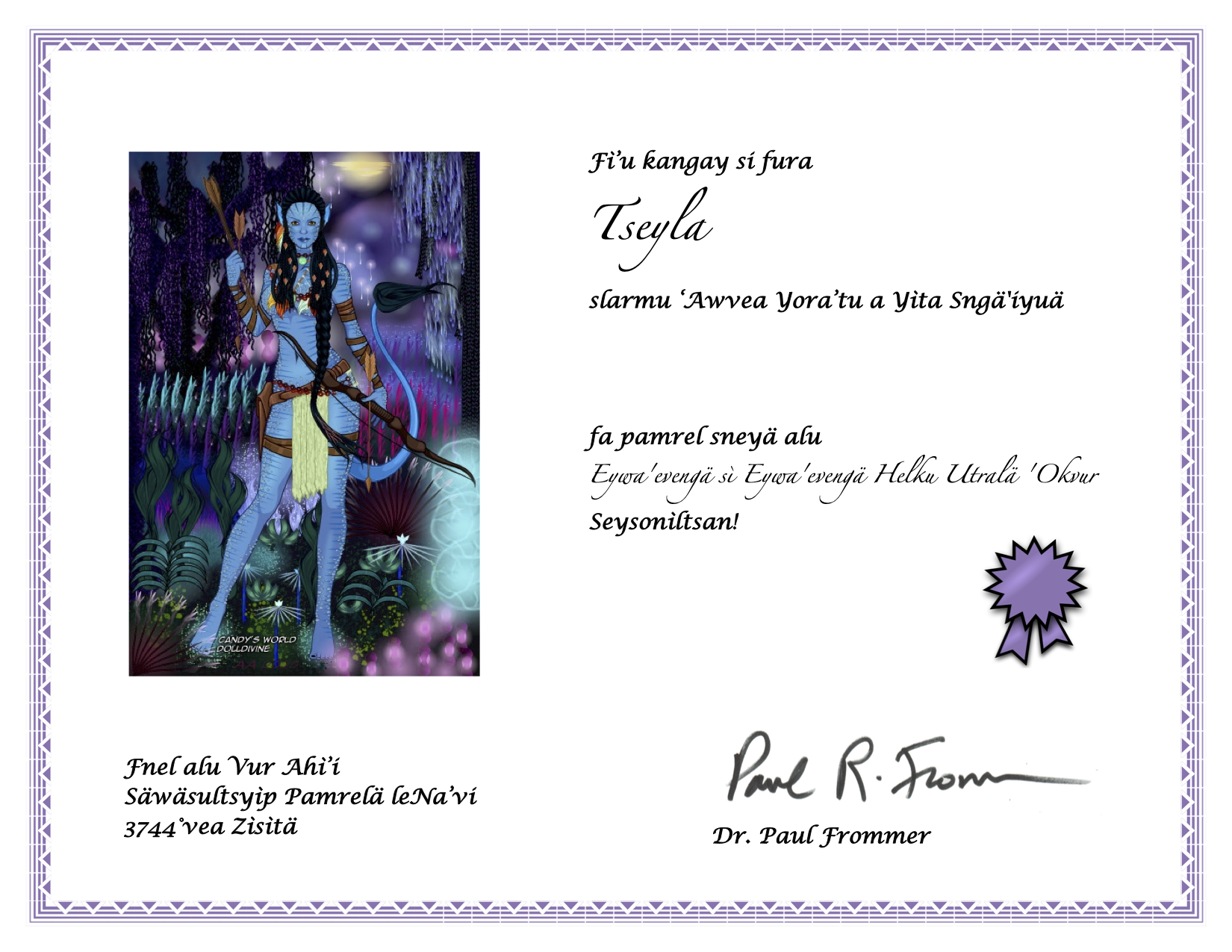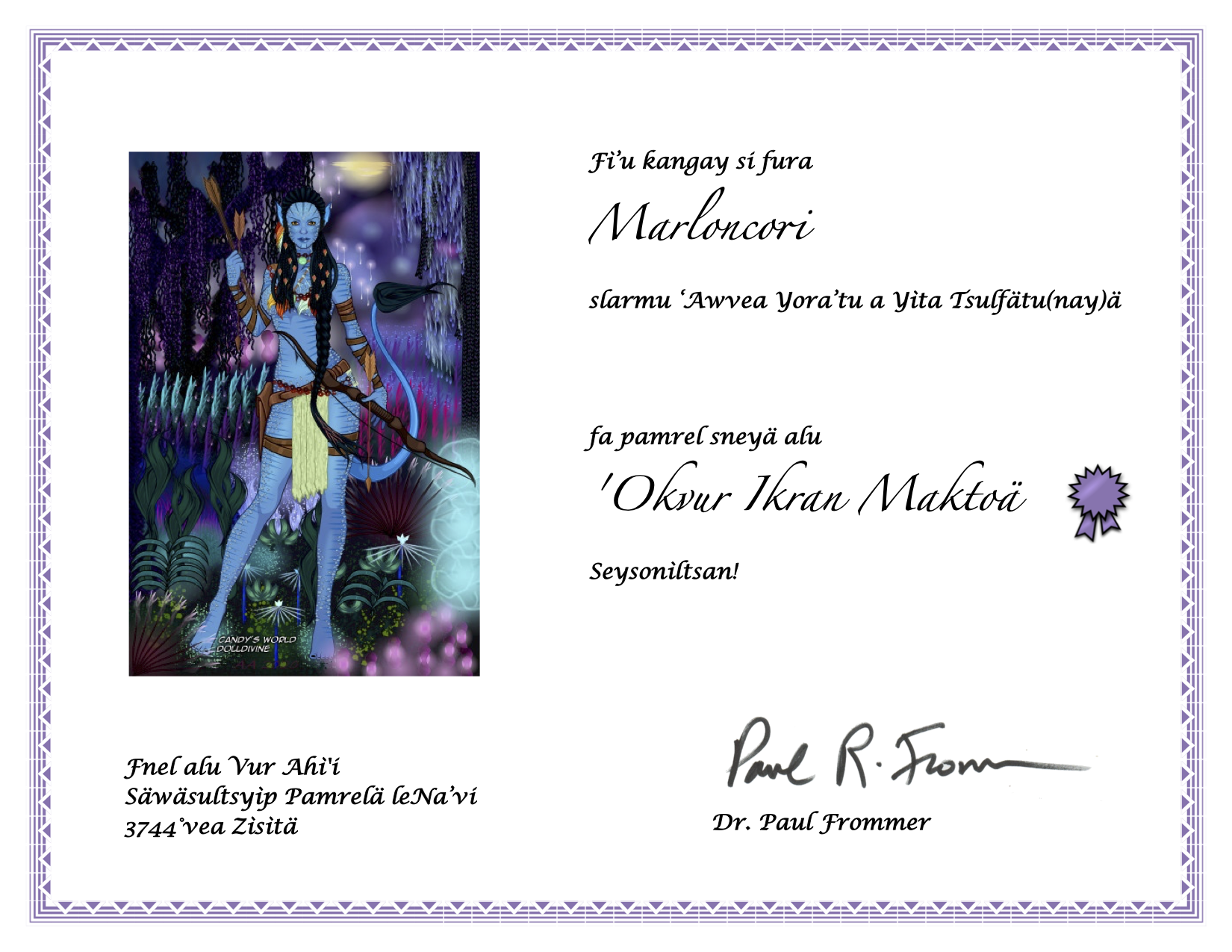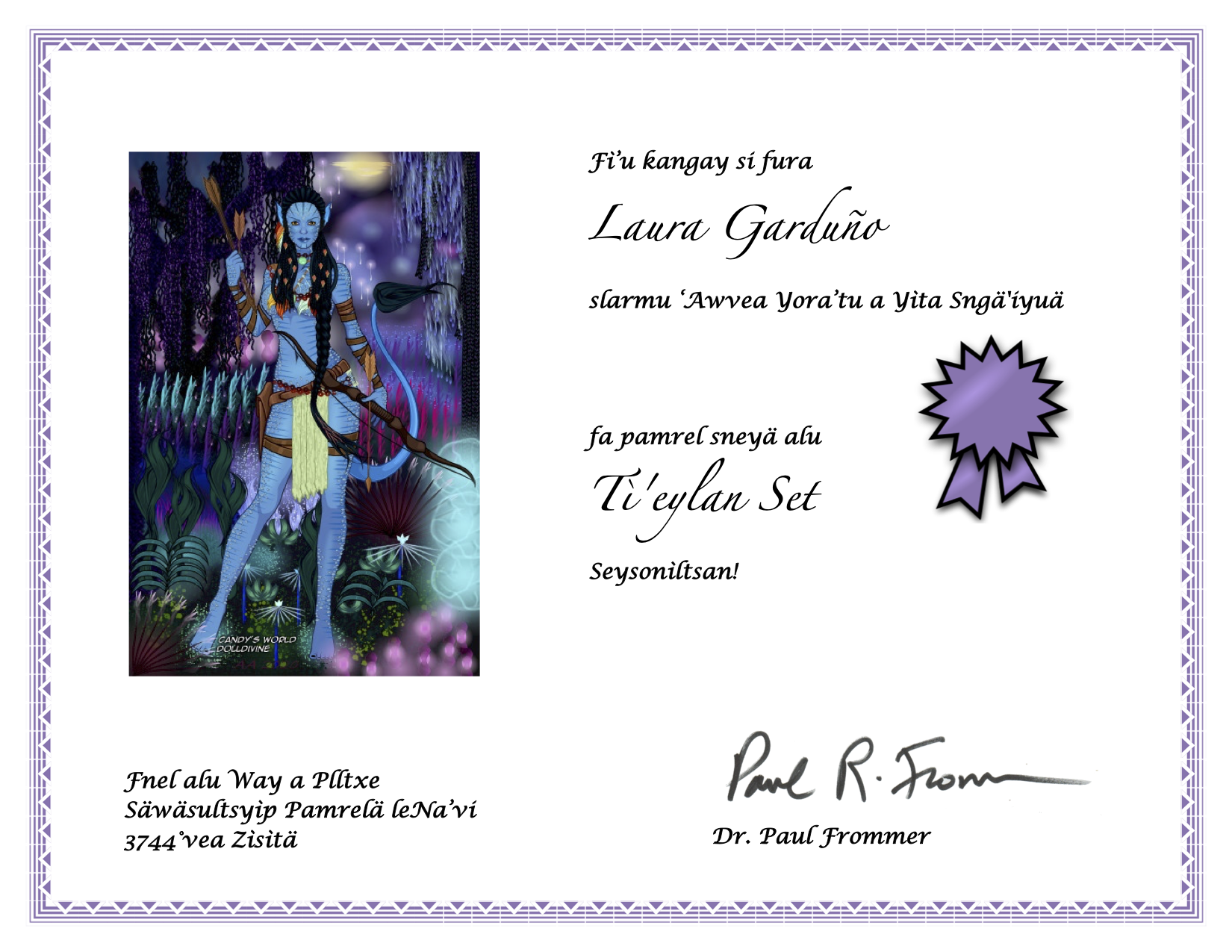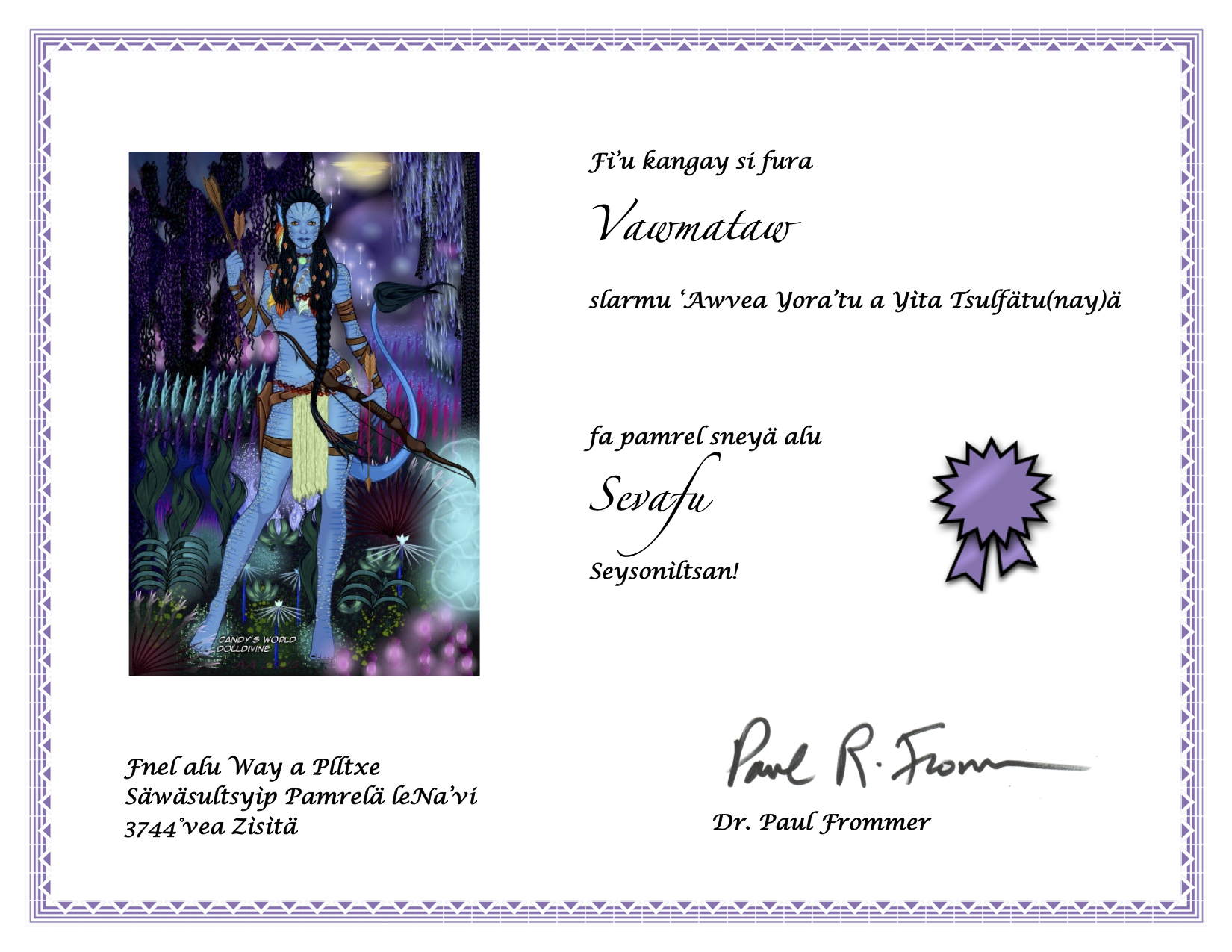Kaltxì nìmun, ma eylan. Sìlpey oe, ayngaru livu fpom nìwotx ulte Ro Helku a Tì’usì’awn Anawm (the Great/Noble Staying-at-Home) ke livu ngäzìk nìhawng.
Here’s some new vocabulary that I hope you’ll find useful. (In retrospect, I see that some of this is on the dark side, which may be a sign of the times. But at least we end on a high note. 😊 )
äzan (n., ä.ZAN) ‘force, compulsion’
äzan si (vin.) ‘force, compel’
Fo äzan soli oer tsnì tsakem sivi.
‘They forced me to do it.’
(The syntax here is parallel to that of Poe mowar soli poanur tsnì hivum, ‘She advised him to leave.’)
äzanluke (adv., ä.ZAN.lu.ke) ‘voluntarily, without force or compulsion’
This word is partially synonymous with nìnew. For example, to say ‘I did it voluntarily’ you can say either Oe tsakem soli nìnew or Oe tsakem soli äzanluke. However, unlike nìnew, äzanluke can be also used on the part of the potential forcer to show that no force is being exerted:
Vin oel äzanluke futa nga kivä poehu.
‘I request, without compulsion, that you go with her.’
In other words: ‘I’m asking you to go with her, but I won’t force you.’
But:
Vin oel futa nga kivä poehu äzanluke.
‘I request that you go with her voluntarily.’
äzantu (n., ä.ZAN.tu) ‘domineering person; one who is bossy, authoritarian, or dictatorial’
nìsok (adv., nì.SOK) ‘recently’
kemuia (n., ke.MU.i.a) ‘dishonor’
This word is clearly derived from ke + meuia ‘honor.’
kemuia si (vin.) ‘dishonor’
Ngeyä tìfnawe’ kemuia soli fìsoaiaru.
‘Your cowardice has dishonored this family.’
tìfnawe’ (n., tì.fna.WE’) ‘cowardice’
kemuianga’ (adj., ke.MU.i.a.nga’) ‘dishonorable’
Peyä hemìl akemuianga’ zamolunge fwìngit ayoer.
‘His dishonorable behavior (literally: actions) humiliated us (lit.: brought humiliation to us).’
tìkankxan (n., tì.kan.KXAN) ‘barrier to one’s goals, source of frustration’
This word is derived from tìkan ‘goal’ + ekxan ‘barrier, obstruction’—that is, a ‘goal barrier.’
Oeri mìftxele, fwa pol oeti ke slolan lu tìkankxan apxa.
‘In this regard, his not supporting me was a large barrier to (achieving) my goal.’
tìkankxanga’ (adj., tì.kan.KXA.nga’) ‘frustrating’
Fìtìfkeytokìl atìkankxanga’ ’eykerefu oet lekye’ung.
‘This frustrating situation is making me crazy.’
To say ‘frustrated,’ we use a different but related expression.
lekxan (adj., le.KXAN) ‘blocked, obstructed; frustrated’
Lu fìfya’o lekxan; ke tsun awnga sivalew.
‘The path is obstructed; we can’t proceed further.’
This word is also used metaphorically to indicate the experience of being frustrated—that is, feeling blocked or obstructed from reaching your goal:
Oe plltxe, po ke tìng mikyun. ’Efu oe lekxan nìtxan.
’I talk, but he doesn’t listen. I feel very frustrated.’
ftanglen (vtr., ftang.LEN, inf. 1,2) ‘prevent’
This word is obviously a compound of ftang ‘stop’ + len ‘happen’: to prevent something is to stop it from happening.
Tsranten nìtxan fwa ftanglen awngal futa fìsäspxin vivirä.
‘It’s very important that we prevent this disease from spreading.’
Derivation:
tìftanglen (n., tì.ftang.LEN) ’prevention’
Tìkan la’ayä ayll lu tìftanglen tìspxinä.
’The goal of social distancing is the prevention of disease.’
pxawtxap (vtr., pxaw.TXAP, inf. 2, 2) ‘squeeze’
The origin of this word is of course pxaw ‘around’ + txap ‘press.’ When you squeeze an object, you press it firmly with your fingers, usually with your hand encircling it to some extent.
Poel oey tsyokxit pxawtxolap a krr, poltxe nìfnu san nga yawne lu oer.
‘When she squeezed my hand, she silently said she loved me.’
vun (vtr.) ‘provide’
Sempulìl asìltsan vun syuvet soaiaru sneyä.
‘A good father provides food to his family.’
And now we know the Na’vi for an iconic Avatar expression:
Eywa vayun.
‘Eywa will provide.’
Finally, I’m delighted to present Vawmataw’s contest-winning narrative poem, “Sevafu.” I think you’ll find it evocative and poignant.
Hayalovay!
Sevafu
’Awlie lu ’evenge a poru fko syaw Sevafu.
Po kelku si mì sray hu Sa’nu sì Sempu.
Pxel frapo pxeforu lu txintìn letsranten.
Kifkeyri Sevafu nume, sa’nu wìntxu ulte sempu zamunge.
Slä sempul fìtxon ke tok kelkut maw kifkeyä tìzamusunge…
Sevafu plltxe san fìtrrkrrka pol na’rìngit folrrfatsen.
Pol fratrr zamunge kifkeyt lerìn fte piveng txonä vurit sìk,
Slä saronyul peng fayluta fkol pot ke rolun kip ayrìk.
Sevafu plltxe san fìtrrkrrka pol kilvanit molaktatso.
Pol fratrr zamunge kifkeyt lepay fte wivìntxu tìreyt sìk,
Slä aysleleyul peng fayluta fìtrr pol kilvanit ke molaktatso.
Sa’nul plltxe fayluta sngum rä’ä sivi maite.
Ulte tsakrr za’u sì ftem krr, fyeyn slu ’ite.
Sempu ke tätxaw, slä kawkrr ke fe’pey tsìlpey.
Trro Savaful pe’un futa kä fwew sneyä sempulit.
Sa’nu ke tsun poru tìftang sivi, Sevaful makto kilvanit.
Popxaw tìran ayutral ulte ayutral tìran popxaw.
Kllte hum ulte txampay piak si txana krrmaw.
Nì’awtu fa yaney Sevafu mì fay amawey fwi.
Kawtu ke ’eyng krra po fwefwi.
Pol tse’a tawti txonä sì payä ayweopxit.
Ayweopx ’ìp ulte pol ripx tawit.
sanhìyä txampay
maweya kifkey apxay
eo tìlor ’ia
Sevaful lang fìkifkeyt sì hifkeyt alahe.
Sempul kea tsenget. Ngian lu syura.
Pol ’efu sempuä syurat atxanwawe.
Ngal tse’a a fratanhì azusup tsakrrta
Lu Sevafuä po tsngawvìk a aungia
Aysempul tìreyt tìng awngaru
Slä nìmun ke tsun tivìng tsat foru.





